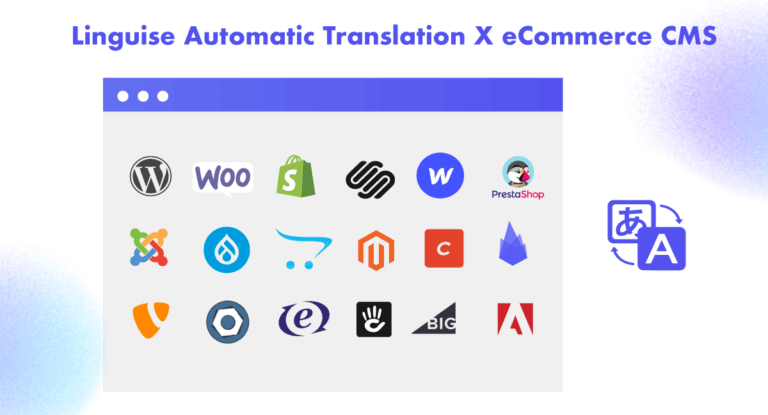Choosing the ideal website hosting provider is a critical decision that can significantly impact the success of your international e-commerce store. Selecting the best website hosting for your online store is crucial for ensuring optimal performance, security, and user experience. With various hosting options available, it can be overwhelming to make the right choice. This article will guide you through choosing the best hosting provider for your international e-commerce store in 2024. We will discuss the importance of getting the best website hosting for e-commerce, evaluate different types of hosting, review the top hosting providers for e-commerce, including e-commerce web hosts, and explore alternative hosting options such as website builders and e-commerce platforms.
Why is it important to choose the best website hosting for e-commerce?
Choosing the best website hosting for creating multilingual e-commerce is essential for the success of your online store. A reliable hosting provider can significantly impact user experience, security, and site speed. With a poorly chosen hosting provider, you may experience frequent site crashes, slow loading times, security breaches, and ultimately lose customers. The best web hosting for e-commerce ensures that your online store operates smoothly, securely, and efficiently, providing your customers with a seamless shopping experience.
Increase your user experience
To create a great user experience for your international e-commerce store, consider the following factors when choosing a website hosting provider:
- Unlimited bandwidth for fast loading times
- E-commerce-specific features for a seamless shopping
- Built-in SEO tools for online visibility
- Live chat support for instant customer assistance
- Multilingual features for international customers
Considering these factors, you can ensure that your e-commerce store provides customers a worldwide smooth and enjoyable shopping experience.
Secure your website
As an e-commerce store owner, the security of your online store and customer data should be a top priority, especially when operating internationally. When selecting a hosting provider, it is essential to prioritize those that offer security features.
We recommend to look for hosting providers that offer SSL certificates. These certificates encrypt customer data during online transactions, providing an additional layer of security. SSL certificates secure customer information and build trust and credibility, which is essential for international e-commerce success.
In addition to SSL certificates, consider hosting providers that offer DDoS protection. Distributed Denial of Service (DDoS) attacks can significantly disrupt the performance and accessibility of your e-commerce store. DDoS protection measures ensure your website remains online and functional, even during such attacks.
Improve loading website
Customers expect fast-loading websites and a slow website can lead to high bounce rates and abandoned carts. When choosing website hosting for your e-commerce store, site speed should be a key consideration.
Consider hosting providers that offer an uptime guarantee. Uptime refers to how long your website is online and accessible to users. An uptime guarantee of 99.9% or higher ensures your e-commerce store is available to customers, maximizing your sales opportunities.
Evaluate hosting providers for their server locations. Choosing hosting providers with server locations in multiple international regions can significantly improve site speed for international customers. When your website’s server is closer to your customers, it reduces the latency and improves the overall website loading time.
What are the most important factors to consider when choosing a hosting service for an e-commerce website?
Next, choosing a hosting provider for your international e-commerce store requires careful consideration of various factors. To make the best choice, consider the following key aspects when evaluating hosting providers.
Speed and bandwidth
As mentioned in the previous section, the speed and bandwidth offered by the hosting provider are crucial factors for international e-commerce success. Look for hosting providers that offer plans with unmetered or unlimited bandwidth, ensuring your online store can handle high traffic volumes without affecting site performance. Bandwidth limitations can result in slower loading times and a poor user experience, leading to lost sales and dissatisfied customers. Additionally, unmetered bandwidth allows for unlimited data transfer, ensuring your site can handle large amounts of traffic without incurring additional fees.
When evaluating hosting plans, consider the server locations of the hosting provider. Choose providers with server locations in your target customers’ regions to minimize latency and provide faster website access to international customers. Fast website loading times are essential for reducing bounce rates and increasing conversion rates, especially for international customers with limited patience for slow-loading websites.
Privacy and security
Privacy and security are critical considerations for an international e-commerce store to avoid online store from attack. When choosing a hosting provider, look for features that prioritize privacy and offer robust security measures to protect your store and customer data. Consider the following:
- Opt for hosting providers that offer free SSL certificates for secure online transactions.
- Choose hosting plans that include DDoS protection to safeguard against potential security threats.
- Prioritize providers that offer daily backups for data protection in case of security breaches or data loss.
- Look for hosting plans that include features like unlimited email accounts for efficient communication with international customers.
Uptime
Uptime, which refers to the amount of time your website is online and accessible to users, is crucial for the success of your international e-commerce store. When evaluating hosting providers, look for those that offer an uptime guarantee, preferably 99% or higher. A reliable hosting service with high uptime ensures your website is consistently available to customers, minimizing potential revenue loss due to website downtime. Consider hosting providers with a strong reputation for uptime, as this indicates their commitment to providing reliable hosting services for e-commerce websites.
Pricing
Pricing is important when choosing a hosting provider for your international e-commerce store. However, it’s essential to strike a balance between cost and features. Consider the following:
- Look for hosting providers that offer the cheapest plans for e-commerce hosting, keeping in mind that the cheapest plan may not always meet your specific requirements.
- Evaluate hosting plans that offer a free trial period, allowing you to test the hosting service before committing to a long-term plan.
- Consider hosting plans that include additional features like a free domain name, SSL certificate, or daily backups, as these can add value to your e-commerce store.
- Select hosting providers that provide free domain names for branding identity and customer trust.
- Explore hosting providers’ pricing options for longer-term plans, as they may offer discounts for annual or multi-year subscriptions, saving you money in the long run.
The size of your budget
Consider the size of your budget when selecting a hosting provider for your international e-commerce store. While choosing hosting plans with features and security measures that meet your business requirements is important, you should also factor in the hosting cost, especially for the first year of operation. Consider the following:
- Assess your budget for web hosting, considering factors like website traffic, storage requirements, and international customer base.
- Look for hosting providers that offer cost-effective plans without compromising essential security features or site performance.
- Evaluate hosting plans that include free SSL certificates, domain names, or daily backups, as these can help reduce costs in the long run.
- Consider the uptime guarantee provided by hosting providers, as downtime can result in lost sales and revenue for your e-commerce business.
Customer support
Customer support is crucial for the success of your international e-commerce store. When evaluating hosting providers, consider the level of customer support they offer, especially for technical support. Look for the following features:
- Prioritize hosting providers offering live chat, phone, or email support, ensuring you can reach them for assistance when needed.
- Consider hosting providers that offer dedicated hosting support, as this ensures prompt and tailored assistance for powering your e-commerce business.
- Look for hosting providers that provide multilingual customer support to cater to the needs of international customers.
- Evaluate hosting providers for their technical support availability, ensuring real-time assistance for e-commerce features like inventory management and payment processing.
Evaluating types of hosting for international e-commerce
When choosing hosting for your international e-commerce store, it’s essential to evaluate different types of hosting to understand which option best suits your business needs. While shared hosting is often cost-effective for startups, other options like VPS or dedicated servers offer more dedicated resources. In the following sections, we will explore the pros and cons of shared hosting for e-commerce and help you determine if VPS or dedicated servers are the right choice for your online store.
The pros and cons of shared hosting for e-commerce
Pros of shared hosting for e-commerce:
- Cost-effective: Shared hosting plans are generally cheaper than other hosting options, making them affordable for startups or businesses on a limited budget.
- Ease of use: Shared hosting providers often offer user-friendly control panels and website builders, making it easy for beginners to create and manage their e-commerce site.
- Scalability: Some shared hosting plans allow for easy scaling as your business grows, allowing you to upgrade to a higher plan to accommodate increased traffic and storage requirements.
- Server maintenance: With shared hosting, server maintenance, security, and updates are managed by the hosting provider, freeing up your time and resources to focus on your e-commerce business.
Cons of shared hosting for e-commerce:
- Limited resources: Since shared hosting involves sharing server resources with other websites, you may experience limited processing power, storage space, and bandwidth, which can impact the performance of your e-commerce site, especially during peak traffic times.
- Security vulnerabilities: Sharing a server with multiple websites increases the risk of security vulnerabilities. If one website on the server is compromised, it can potentially impact the security of other websites hosted on the same server.
- Lack of customization: Shared hosting plans may have limitations in terms of customization options, restricting advanced website functionalities or specific software installations tailored to your e-commerce business needs.
- Evaluate the pros and cons of shared hosting against your e-commerce business requirements to determine if it’s the right hosting option for your international store.
Is VPS the right choice for your e-commerce store?
When considering the needs of your e-commerce store, you may wonder if shared hosting is the best option for you. While shared hosting may be an affordable choice, it could also be limiting in terms of resources and features. If you’re looking for more scalability and control over your e-commerce platform, virtual private server (VPS) hosting could be the right choice for you. With VPS hosting, you’ll have access to your own virtual server with dedicated resources, providing more control and flexibility. It may be more expensive than shared hosting, but it offers more scalability and features similar to a dedicated server without the high cost. And if you’re running a more significant site with a need for unlimited databases and email accounts, dedicated servers are also a viable option.
E-commerce hosting alternatives
When considering e-commerce hosting alternatives, exploring other options beyond traditional web hosting services is crucial. One alternative to traditional hosting is utilizing website builders, such as Squarespace, which offers an all-in-one platform for building, including multilingual and hosting your e-commerce business. Additionally, e-commerce platforms provide a comprehensive solution that combines hosting with essential e-commerce features, streamlining the process of setting up and managing an online store.
Website builders
When considering website builders as an alternative to traditional hosting, it’s essential to note that they offer intuitive drag-and-drop tools for building e-commerce sites. In addition, some website builders provide built-in SEO tools designed explicitly for optimizing e-commerce websites, making them a valuable option for businesses aiming to enhance their online visibility. One of the primary advantages of website builders is their suitability for individuals with limited technical knowledge in web development, allowing them to create and manage professional-looking e-commerce sites without extensive coding expertise. Moreover, many website builders offer free trial periods, enabling users to test various features before committing.
E-commerce platforms
E-commerce platforms allow you to create a website without designing it from scratch. This is especially useful for international e-commerce stores that may need to cater to different languages and currencies. However, choosing the right hosting provider for your needs is important. For example, if you expect high traffic, you may want to consider a hosting provider that can handle more visitors without slowing down your e-commerce website. Additionally, you should be aware of transaction fees that may be applied to online sales. Some hosting providers charge a percentage of each sale made through your e-commerce website, which can add up quickly. Read the fine print and choose a hosting provider that fits your budget and needs.
Integrating Linguise with Your E-commerce Hosting

No matter which hosting solution you choose for your e-commerce platform, Linguise offers seamless compatibility. It’s tested and integrated with popular cloud hosts like WooCommerce and Shopify and website builders like Webflow, GoDaddy, and Hostinger.
- Integration with Over 40+ CMS: Integrated with more than 40 different CMS, this wide range of compatibility ensures that regardless of the CMS your e-commerce platform is built on, Linguise can seamlessly integrate and function effectively.
Live Editing of Translations: Once integrated, Linguise automatically translates your website content. If certain translations don’t align with your brand voice or seem contextually off, the live editor feature of Linguise allows for immediate, on-the-spot adjustments. This ensures that your content accurately resonates with each segment of your international audience.
Supports Translation Exclusion: A unique feature of Linguise is its ability to exclude specific content from translation. This is particularly beneficial for content that includes specialized technical terms or universally understood phrases. The exclusion feature allows selective omission of parts of your website from being translated, based on URLs, specific text, or even certain lines. This capability ensures precision in translation and maintains the integrity of your technical content.
Effortless Multilingual SEO: Linguise simplifies the complexities of multilingual SEO. By adhering to search engine recommendations, it automatically generates alternate URLs and correctly implements language and default language tags. This feature is vital for ensuring that your site is optimized for search engines across different languages, enhancing visibility and driving international traffic to your site.
Combining the right hosting solution with Linguise’s advanced translation, SEO features, and broad CMS compatibility can significantly elevate your international e-commerce store’s performance, user experience, and global reach.




